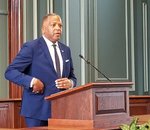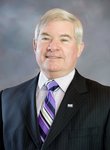






A week after her resignation, former Fayetteville City Councilwoman Tisha Waddell sat in her nicely appointed home on Pearl Street, a home she rents out through Airbnb, and proceeded to discuss her reasons for calling it quits.
When she resigned, Waddell wrote a five-page letter that, among other things, accuses Mayor Mitch Colvin of working behind the scenes in an effort to have the city and the Fayetteville Public Works Commission enter into a contract with a private equity firm that was promising to pay millions of dollars up front to operate the Fayetteville Public Works Commission for 30 years.
“Recently,” Waddell wrote, “the possible effects of this agreement and the lack of transparency surrounding this conversation have been a vast topic of concern in the community.”
Waddell alleges that a cozy relationship exists between Colvin and Jonathan Charleston, the bond attorney for the city and the PWC who also has served as a private lawyer for the mayor, and, according to Waddell’s letter, at least three other council members.
Waddell said she has no ill-will toward Colvin, she just wants to set the record straight and find the truth. Waddell has asked the council to conduct an independent investigation of her allegations. If that fails to materialize, she said, residents should request a state or federal investigation.
“If nothing comes up I’ll be relieved and will be very eager to say I apologize,” she said.
Waddell said that her allegations are not politically motivated and that she has no intentions of running for mayor.
“This is purely professional,” she said. “But in terms of timing, I knew that in order to get the community to pay attention to this...I had to step down out of my seat in order to make them.”
Colvin has repeatedly called the allegations baseless.
Among her allegations, Waddell asserts that Colvin, Charleston and Steve Benjamin, the mayor of Columbia, South Carolina, were working privately together to bring the Bernhard Capital Partners concession agreement to Fayetteville. As mayor, she said, Colvin has an obligation to keep council members informed.
Council members Johnny Dawkins, Larry Wright Sr. and Kathy Keefe Jensen said they know almost nothing about Benjamin, who did not respond to CityView TODAY’s requests for comment.
“I don't know him,” Jensen said. “If he walked up to me and said, ‘Hey, I'm so and so,’ I'd be like, ‘nice to meet you.’ ”
But internet searches and emails that CityView TODAY obtained through public records requests to the city of Columbia show a connection among Colvin, Charleston, Benjamin and the equity firm.
It’s uncertain how long Colvin and Benjamin have known each other. They may have met in 2016, when then councilman Colvin and other city officials toured Columbia’s baseball stadium. Or it could have been in 2018, when Colvin attended a seminar that Benjamin led as president of the U.S. Conference of Mayors.
The first reported meeting of the two men happened on April 5, 2019. According to a city of Fayetteville news release, topics discussed during the meeting included “Opportunity Zones, federal infrastructure resources and baseball.”
Two months later, Fayetteville officials held their first meeting with Bernhard Capital Partners.
Five months later, on Dec. 2, 2019, Benjamin swore in Colvin for his second term as Fayetteville’s mayor.
The following month, the emails show, Benjamin attended a meeting with Bernhard representatives in Washington, D.C. The focus of the meeting, according to one email, was for Bernhard to get more involved with the Conference of Mayors.
“Good Afternoon Mayor Benjamin,” an email from a Bernhard representative began. “The team greatly enjoyed meeting you this afternoon. We hope that you are able to join us for the reception that we are hosting at the St. Regis Hotel.” Benjamin indicated in another email that he would like to attend the reception.
Less than two months after that meeting, on March 10, 2020, a news release shows that Benjamin joined Charleston’s law firm as co-chairman of its public finance and affordable housing practices. Benjamin has practiced law for decades.
Other emails from Columbia show that Charleston’s law firm and Bernhard Capital Partners are included on a list of 10 companies that pose a potential conflict of interest for Benjamin. The list is required under South Carolina law to disclose any potential action or decision that could directly affect an economic interest.
Other emails show that Benjamin accepted Colvin’s request to swear him in as mayor, as well as a vague message indicating that Benjamin and Charleston were trying to set up a meeting.
In none of the emails do Colvin or Charleston discuss the Bernhard proposal with Benjamin.
In her resignation letter, Waddell drew some of the same connections to Benjamin, Charleston, and Bernhard, as well as additional ones.
In November 2020, Benjamin appeared in a Bernhard brochure. Benjamin’s co-authored piece was titled “Setting up public-private partnerships for success.” The article can no longer be found on the internet, but Councilwoman Shakeyla Ingram saved a copy of it last year.
Waddell also said Benjamin attended a closed-door meeting at Fayetteville State University on Dec. 1, 2020, that was held to further discuss the Bernhard proposal.
Waddell acknowledged that she didn’t attend that meeting. But Ingram said that she did, and that Benjamin was there. At that meeting, Bernhard again pitched its proposal to operate the PWC. Ingram acknowledged that Benjamin did not speak, other than to introduce himself.
But Ingram and Waddell said it appeared to them that Benjamin was present to help persuade city and PWC officials to support the Bernhard proposal.
Ingram said Charleston attended the beginning of the meeting and then left before it became a closed session.
“This seems to present a conflict of interest as Mr. Charleston serves as the bond council (sic) for the City of Fayetteville and the Public Works Commission, Mr. Benjamin’s employer, and Mayor Colvin’s attorney. The overlap seems, at minimum, to present a conflict,” Waddell wrote in her resignation letter.
Charleston acknowledged that he attended the meeting, adding “so what?”
“I went to the meeting,” he said. “It was a public meeting and I went. And then they went into a closed session and I left and went home.”
As bond counsel, Charleston gets paid by the city or PWC only when bonds he has helped prepare are issued. He is not a city or PWC employee. He denies any conflict of interest and added that engagement agreements he signed with the two entities waive him of any potential conflicts of interest.
In another matter, Waddell said Charleston was also privately asking some council members to support Don Porter’s nomination as a PWC board member. Ingram said Charleston sent her a text asking for her support of him.
The council was supposed to have picked a successor to PWC board member Darsweil Rogers in September 2021. Waddell speculates that a decision was postponed because Colvin and Charleston wanted Porter, who they thought would support the Bernhard proposal, but they needed a majority of council members on board. Porter was chosen for the seat on Nov. 22 by a vote of 5-4.
Colvin repeatedly declined to be interviewed by CityView TODAY unless Waddell makes specific allegations. Charleston talked to the publication on several occasions, dismissing Waddell’s allegations entirely and raising one of his own.
Charleston said that when CityView TODAY publisher Tony Chavonne was mayor, he and Chavonne met privately with high-level representatives of Duke Energy. He said the meeting was held to discuss Duke’s interest in purchasing the PWC. Charleston questioned whether that was any different than what Waddell accuses Colvin of doing.
“I do not remember that at all,” Chavonne responded in an email. “I undoubtedly met lots of people in those 8 years, but can 100% say there (was) never any discussion of selling PWC or their management with anyone from Duke or anywhere else…Would certainly never have signed any NDA or would not have been involved with the Utility's own Bond Counsel in negotiating their potential sale - a conflict of interest. He is diverting attention.”
Charleston said he has known Steve Benjamin for years, starting when they worked together in Raleigh. He called Benjamin a well-respected mayor who served as president of the national Conference of Mayors and has traversed the country speaking to influential groups about smart cities and public-private partnerships.
Benjamin had been Columbia’s mayor for 10 years before announcing last year that he would not seek re-election. He has been nominated to sit on numerous national boards and committees, including an appointment by President Biden to head a committee seeking to expand broadband throughout the country.
“Steve is a big deal,” said Charleston, who chafed at Waddell’s allegations.
“So what if someone was pitching a deal to the city?” Charleston said. “So what if somebody was pitching a deal to PWC? Where is the harm? Where is the foul?
“I am not going to let you guys go down some rabbit hole and try and make people look bad. If you did any reasonable diligence, you would ask the same question: So freakin’ what?”
Charleston noted more than once that no deal has ever been signed, and if one had gotten that far it would have had to undergo state scrutiny.
Charleston dismissed other allegations Waddell made, including the implication that something was amiss when Benjamin swore in Colvin as mayor. Charleston said North Carolina Supreme Court Justice Mike Morgan was supposed to have sworn in Colvin but had to cancel at the last minute. Benjamin was then selected as Morgan’s replacement, Charleston said. Morgan did not return emails seeking verification.
Another allegation by Waddell appears more difficult to dismiss.
Three months after the PWC announced publicly that it had stopped negotiating with Bernhard - in early August 2021 – Charleston held a fundraiser at his home for Colvin’s re-election campaign. Charleston acknowledged that Bernhard’s representatives attended the fundraiser, but he said they did not write any checks. Gov. Roy Cooper was also among an estimated 150 people who attended.
Charleston said he remembers that Jeff Yuknis, a managing partner with Bernhard, attended the fundraiser. He said a couple of other people from the firm may have also attended.
“If you're selling, do you stop selling because the customer says ‘today I'm not interested?’ ” Charleston said. “It's like going to buy a car.”
Fayetteville lawyer Randy Gregory said he attended the fundraiser, too, and remembers seeing a Bernhard representative there. Gregory said he began touting the Bernhard proposal at the request of Tony Rand, a powerful former state Senate majority leader from Fayetteville who died in 2020.
Gregory said he has never been promised any money for his work with the Bernhard proposal.
“I have never had any conversation with Bernhard about a fee, sir, and to my knowledge Jonathan hasn’t either because Tony asked Jonathan to help,” Gregory said. “You all are acting like this is something Jonathan, the mayor and Mr. Charleston are plotting or something. That's bull(expletive). You can print it. It's all been done in public. And Tony was the one that put the proposal out there. Just tell me who else has gone on his deathbed trying to help the city.”
Colvin is required to file campaign finance reports that list his donors and the amounts of their contributions. The latest report filed by Colvin is for the period from Jan. 1, 2021, through June 30, before the fundraiser was held. The next filing period ended Dec. 31. The reports have yet to appear on the Cumberland County Board of Elections’ website.
Charleston noted that Bernhard has been trying to get utility concession agreements throughout the Southeast.
“I didn't have anything to do with Bernhard's decision around pitching to Fayetteville, to Kinston to wherever else they went,” he said. “Not at all.”
In a statement, Bernhard partner Jeff Jenkins said his firm began to pursue investing in Fayetteville at the urging of Rand.
Ralph Huff, who had been a member of the PWC board from 2017 until February 2020, said the board had always been skeptical of Bernhard’s proposal. Huff said he stayed on the board about four months after his term expired because it had just selected Elaina Ball as its chief executive and he wanted to ensure a smooth transition.
Huff said Charleston asked him to stay on the board even longer.
“I'm going to say that he urged me to stay on the board and I'm also going to say that 100 other people urged me to stay on the board,” Huff said. “But him wanting me to stay on the board was because he probably thought I would support the Bernhard deal.”
Charleston initially said he never urged Huff to stay on the board but then added that if he did, he doesn’t recall it.
“I wouldn't have the authority anyway to tell Huff to stay on the board,” he said.
Huff has a different view of the course of events.
“Just to be clear, Tony Rand on his deathbed told Randy Gregory he needed to talk to me, to promote the deal to me, and he did. And then later Jonathan, you know, promoted it to me.”
Gregory said Rand presented the Bernhard proposal to him and kept pushing it almost until the day he died.
“Tony said to me on Sunday, before he died on Thursday, he said to me, ‘Randy, close this deal. The city needs the money. Promise me you're going to try to close this deal,’ ” Gregory said. “Truly, that is about his last words to me… because he felt like it was that good of a deal for the city.”
Gregory said he and Rand asked Charleston to assist them with the Bernhard proposal.
“Jonathan does bond work with cities and counties and understands that as well as anybody,” Gregory said. “Jonathan and I and Tony have worked other deals together dealing with bond work structures. That’s how Jonathan got in it. We asked him to help us with it.”
Gregory said Benjamin was brought in for similar reasons.
“As the mayor of Columbia, South Carolina, he understands city government workings to help explain how things can be put together and putting proposals together,” Gregory said. “If you want to try to figure out how to do something new you need to have people involved who understand governmental operations.”
Huff said he and some other business people in town had a private meeting with Charleston just before the meeting with the PWC, City Council and Bernhard representatives at FSU.
“I had a meeting at Jonathan's request to meet with the officers of Bernhard,” Huff said. “And in that meeting ... we were pretty sure that we didn't like the deal based on how it was presented. And I said in the meeting, ‘If we're gonna do this with PWC then we just need to sell it.’ ”
Charleston acknowledged that the meeting took place.
“So what,” he said. “Show me one rule that was violated by doing that. Give me one.”
Two weeks after that meeting – on Dec. 16, 2020 – Wade Fowler, then the PWC board’s chairman, wrote a letter to Bernhard saying the PWC wasn’t interested in accepting the firm’s letter of intent, the first big step toward entering an agreement. Fowler called the letter of intent “premature and not able to pass prudency standards for utility governance in decision making.”
In another letter, this one to Colvin dated March 18, 2021, Fowler said the PWC was not interested in pursuing an agreement with Bernhard “at this time.” The PWC officially got out of negotiations with Bernhard in May, announcing its decision publicly.
Afterward, Waddell said she wanted to know whether the city was going to make the same public disclosure.
“So I go back to our staff and I say, ‘Listen now that PWC has taken this off the table do we want to follow suit and issue a statement saying we're done with this?’ And it was very, like the answer was very evasive, but it was not affirmative.”
In September 2021, the PWC took the unusual step of passing a resolution stating that it “has no intention at this time of considering any unsolicited confidential offers to purchase or control by concession arrangement any or all of PWC’s major utility assets, operations or financing.”
Prior to that, a New York-based private investment firm called Stonepeak had made an unsolicited bid to buy the PWC.
Until recently, city officials had never said publicly that the Bernhard negotiations are over.
On Nov. 30, City Manager Doug Hewett said in an email that “at this time City staff members don’t have direction from City Council to work on this. Unless City Council gives us direction we will not pursue this issue further.”
Colvin’s response by email to CityView TODAY was more definitive as to whether the deal was over.
“Yes,” he wrote, “neither the city council nor the commission chose to accept the Bernhard proposal. I have always said on the record if a concession were to be considered in the future, I would only support an open bid process.”
In November, the PWC issued nearly $95 million in bonds at a historic low of 2.28 % interest. The bonds will be used to fund improvements to the PWC’s electric, water and wastewater utilities, including $22 million for the “big bang” annexation area of 2005, the utility said in a news release. Charleston’s law firm served as the bond counsel.
“The investment continues to address PWC’s multi-year plan of rehabilitation and replacement of aging infrastructure to ensure safe and reliable services for our 118,000 customers,” Ball, the PWC’s leader, said in the release.
Gregory suggested that the Bernhard proposal led the PWC to seek the bond issue.
“I don't know what their inner talkings were, but it hadn't happened before now,” he said. “But that's fine. I don't know why we hadn't done it before now, after 10 years, but that's just a drop in the bucket of what this city needs.”
Waddell said she had been pitching for bond revenues for water and sewer infrastructure improvements all along. She said the Bernhard proposal made no sense to her.
Why leverage the PWC for 30 years for about $300 million when the utility would provide the city about the same amount in revenues in that time period,? she asked. The PWC gives the city about $12 million annually. It also pays for the city's street lights.
“If you were going to go and buy a house and you could borrow money on your own accord for 3 percent interest and I came to you and I said ‘Listen, I own a private equity firm. I will give you the money to buy your house flat out right now. You don't have to take out a loan to buy your house. I'm gonna give it to you flat out, but I'm gonna give it to you for 17% interest’... What deal are you going to take.”
Huff said he didn’t favor the Bernhard proposal for much the same reason. He also said Ball told him that at the end of the 30-year agreement with the equity firm, the PWC would have to confront another large bill.
“The way it turned out, it was like we had to turn around and buy it all back,” Huff said.
Bernhard Capital Partners was established in 2013 by Jim Bernhard, founder of the Fortune 500 company The Shaw Group, and former Shaw executive Jeff Jenkins. The Shaw Group, a global pipe and steel fabricator, was later sold for $3 billion.
For the fourth straight year, Bernhard Capital Partners has made Private Equity International’s list of the world’s 300 largest private equity firms, coming in at 249. Bernhard has raised $2.3 billion since 2016.
Through its heritage with The Shaw Group, Bernhard Capital Partners bills itself as a leader in disaster relief efforts, noting its recovery and relief efforts following hurricanes Katrina and Sandy.
Bernhard, which has public-private partnerships with hospitals, says its proposal to operate municipal utilities provides essential capital to towns and cities to expand and rehabilitate aging infrastructure. A North Carolina study in 2017 estimates that $26 billion is needed to fix and replace deteriorating water and sewer systems statewide.
But not everyone is sold on Bernhard’s attempts to leverage public utilities, including The American Public Power Association, which represents the interests of about 2,000 towns and cities nationwide.
In an industry brief in May, the association said a proposal such as that being offered by Bernhard could result in a city no longer having the ability to make decisions related to their utility, “thereby inhibiting local input into critical decisions that are in the best interest of the community such as generation mix, environmental concerns and the effects of rate changes.”
The association also expressed concern about a reduction in long-term revenues for a city under a Bernhard agreement and decisions driven by profit potential. To reach a desired rate of return, the association said, private investors may either raise customer rates or reduce expenses.
“While the private investment company may claim that rates will remain at current levels, there is no guarantee of such a claim over the life of the contract,” the association said in its brief, adding that the city may no longer have access to lower-cost financing through tax-exempt municipal bonds.
In addition, the association said, a partnership like the Bernhard proposal “could lead to less reliability, and there is no guarantee that the workforce and employee wages and benefits won’t be reduced.’’
“In an effort to reduce costs, the private investment may choose to reduce ongoing investment in the system,” according to the association. “A decrease of investment in critical or aging infrastructure or in replacement and repair projects will have a negative impact on reliability.”
If the city and the PWC decided that the Bernhard proposal wasn’t a good fit for the city and the PWC, why did negotiations with the equity firm span three years, and why didn’t Waddell come forward much sooner with her allegations?
Waddell said she did come forward, to the extent that the nondisclosure agreement would allow.
“I've been asking for the City Council to look closely at our processes and our policies and our procedures, how we're applying them and how we're doing business, but I've not been able to gain the support of at least six members of council,” she said. “But I've been, and public records will demonstrate, that I have been consistently, for at least two years, asking for this clarity.’’
Huff was asked if he saw any merit to Waddell’s allegations and whether people had been trying to pitch the Bernhard proposal behind the scenes.
“You know, on the surface, I think that Randy Gregory would like to see it happen,” Huff said. “I think Jonathan Charleston would like to see it happen. I think there's the possibility that the mayor would like to see it happen. But I haven't found anybody that really knows as much as I know that’s in favor of it.”
Huff said the fact that Charleston was in his office pushing for the Bernhard proposal makes him think that he was in favor of it.
“But attorneys are hired all the time to do things that, you know, they have a client and the client says ‘I want you to represent me doing this.’ ’’ Huff said. “I don't see anything illegal about that. That's what they do.”
Gregory called Waddell’s allegations that the council and the public were purposely kept in the dark “erroneous.”
“Every discussion that happens in the city government on something, you don't run to the newspaper with it,” he said. “Preliminary discussions on a lot of things aren't published in the newspaper. We don't call the reporters up.”
Although the city and the PWC now say negotiations with Bernhard are over, the private equity firm still won’t close the door.
“We continue to believe that such a partnership could deliver substantial benefits to Fayetteville residents,” Jenkins, the Bernhard partner, said in a statement released Dec. 13. “We are happy to participate in a transparent formal proposal process, as we know there are other private firms that have either submitted proposals to PWC or otherwise expressed serious interest in the opportunity.”
Greg Barnes is an investigative reporter for CityView TODAY. He can be reached at gregbarnes401@gmail.com. Have a news tip? Email news@CityViewTODAY.com.